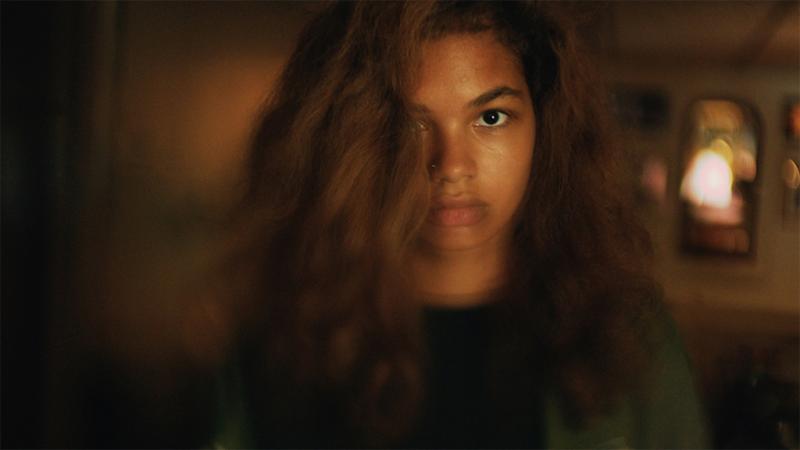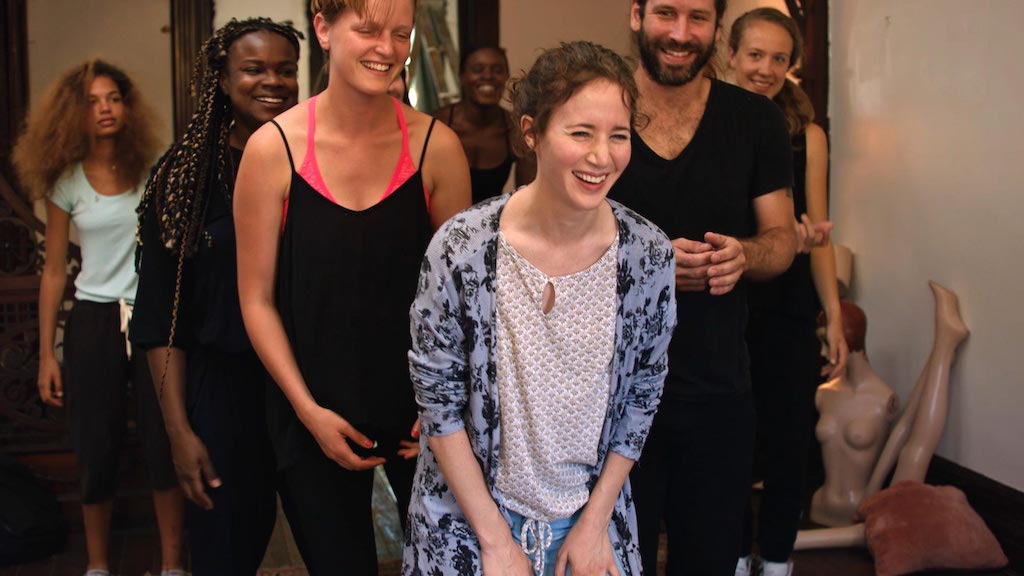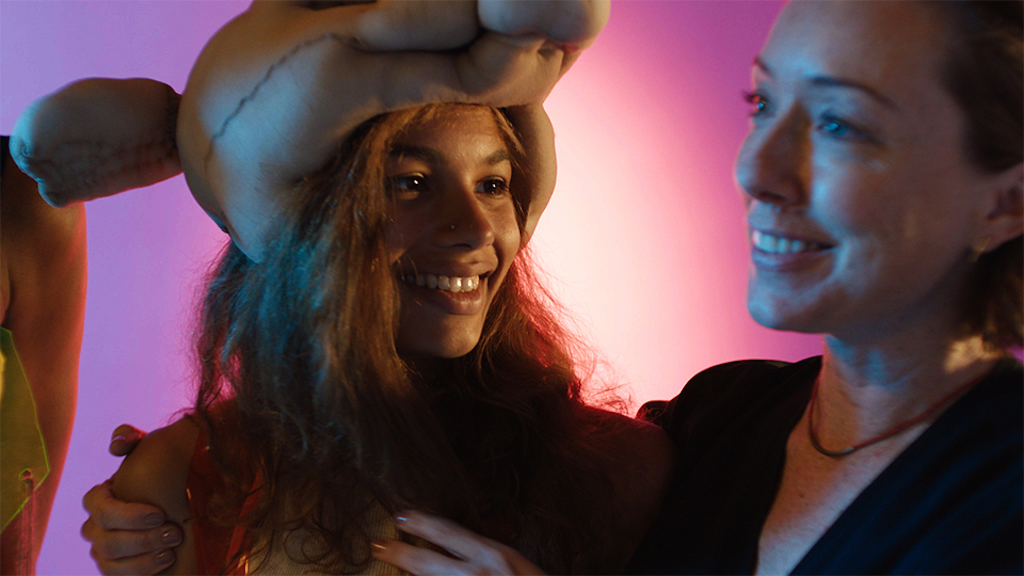Madeline's Madeline review – American indie heralds an astonishing new star | reviews, news & interviews
Madeline's Madeline review – American indie heralds an astonishing new star
Madeline's Madeline review – American indie heralds an astonishing new star
Art and life become dangerously entangled in auspicious debut for Helena Howard

“You are not the cat.
An initially puzzling title is, therefore, perfectly precise, as the young Madeline attempts to find her voice – to be her own person – amid the frantic demands of others. And a story that appears to be extremely unusual adopts a coming-of-age universality.
Writer/director Josephine Decker pulls off another trick, by conjuring an experimental film, almost poetic in its expression, that is challenging but also incredibly appealing; and a good deal of the credit for that goes to its electrifying young star. Madeline’s Madeline is not just a confirmation of Decker (Butter on the Latch, Thou Wast Mild and Lovely) as one of America’s most promising directors, but a breakout movie for Helena Howard.
 Madeline is a bi-racial, 16-year-old, living with her mother Regina (Miranda July, pictured above) and young brother in New York. We learn almost everything about her through allusion, stray comments, rather than anything on screen: that other kids make fun of her at school (we actually never see her at school); that she may have spent time in a psychiatric ward and is on medication. Her father is absent, though his porn-splattered basement den remains.
Madeline is a bi-racial, 16-year-old, living with her mother Regina (Miranda July, pictured above) and young brother in New York. We learn almost everything about her through allusion, stray comments, rather than anything on screen: that other kids make fun of her at school (we actually never see her at school); that she may have spent time in a psychiatric ward and is on medication. Her father is absent, though his porn-splattered basement den remains.
The girl’s one source of pleasure is the physical theatre group led by Evangeline (Molly Parker, pictured below right, with Howard), of which she appears to be the youngest member by far. Madeline has an intense, febrile talent, whether impersonating animals (hence the cat; there’s also an amusing turtle) or conjuring a plethora of very human emotions; at the same time, this talent is impossible to distinguish from her unpredictable personality. Yet rather than nurture her, Evangeline is about to exploit her vulnerability, in particular her troubled, incendiary relationship with her mother.
Whatever Madeline’s mental issues, Regina is part of the problem if not the cause. The woman is highly-strung, over-attentive and too often over-reactive. It may be amusing when she takes her daughter’s playacting for real, but the tension between these two fragile women – perhaps based on shared abuse from absent husband/dad – is more often very difficult to watch.
In contrast to Regina, Evangeline is sophisticated, physically at ease with the girl, and seemingly sympathetic. But she’s under pressures of her own, including the need for months of improvisation and animal crackers to coalesce into a script. And she begins to demonstrate her own sort of derangement as, Svengali-like, she zeroes in on Madeline’s problems for her story. 
There would be an unavoidable meta flavour to Madeline’s Madeline even without knowledge of the production history. Decker discovered Howard while judging a contest for young actors, immediately set out to collaborate with the youngster, and developed the film through workshopping with the very same actors who we now see, on screen, workshopping ideas for a play. The permutations of life, art and imitation are many, the musings on the creative process intriguing – and after all, this is the city where Brando and his Method contemporaries learned to make hay with their own, messed-up feelings.
With her cinematographer Ashley Connor, Decker combines point of view shots, shallow focus, the wacky improvisations of the troupe (with masks to match) and close-ups of the dark-eyed, ever-expressive Howard to construct an adventurously elliptical narrative that floats between Madeline’s inner life, her dreams, play-acting and actual experience.
And Howard’s mesmerising, mercurial performance (gamely supported by indie stalwarts Parker and July) perfectly embodies that unnerving question posed by her character, of whether we’re watching intuitive acting or the danger of mental breakdown. It really is an extraordinary film debut.
Alongside the unconventional style, the risk for Decker is that the kind of improvisational troupe who prance about as animals in search of meaning won’t be everyone’s cup of tea. That said, there’s a healthy amount of thespian bubble-bursting here, of egos pricked, genuine camaraderie discovered and, ultimately, the presentation of performance as truly liberating for a young soul in need.
The future of Arts Journalism
You can stop theartsdesk.com closing!
We urgently need financing to survive. Our fundraising drive has thus far raised £49,000 but we need to reach £100,000 or we will be forced to close. Please contribute here: https://gofund.me/c3f6033d
And if you can forward this information to anyone who might assist, we’d be grateful.

Subscribe to theartsdesk.com
Thank you for continuing to read our work on theartsdesk.com. For unlimited access to every article in its entirety, including our archive of more than 15,000 pieces, we're asking for £5 per month or £40 per year. We feel it's a very good deal, and hope you do too.
To take a subscription now simply click here.
And if you're looking for that extra gift for a friend or family member, why not treat them to a theartsdesk.com gift subscription?
more Film
 Can I get a Witness? review - time to die before you get old
Ann Marie Fleming directs Sandra Oh in dystopian fantasy that fails to ignite
Can I get a Witness? review - time to die before you get old
Ann Marie Fleming directs Sandra Oh in dystopian fantasy that fails to ignite
 Happyend review - the kids are never alright
In this futuristic blackboard jungle everything is a bit too manicured
Happyend review - the kids are never alright
In this futuristic blackboard jungle everything is a bit too manicured
 Robert Redford (1936-2025)
The star was more admired within the screen trade than by the critics
Robert Redford (1936-2025)
The star was more admired within the screen trade than by the critics
 Blu-ray: The Sons of Great Bear
DEFA's first 'Red Western': a revisionist take on colonial expansion
Blu-ray: The Sons of Great Bear
DEFA's first 'Red Western': a revisionist take on colonial expansion
 Spinal Tap II: The End Continues review - comedy rock band fails to revive past glories
Belated satirical sequel runs out of gas
Spinal Tap II: The End Continues review - comedy rock band fails to revive past glories
Belated satirical sequel runs out of gas
 Downton Abbey: The Grand Finale review - an attemptedly elegiac final chapter haunted by its past
Noel Coward is a welcome visitor to the insular world of the hit series
Downton Abbey: The Grand Finale review - an attemptedly elegiac final chapter haunted by its past
Noel Coward is a welcome visitor to the insular world of the hit series
 Islands review - sunshine noir serves an ace
Sam Riley is the holiday resort tennis pro in over his head
Islands review - sunshine noir serves an ace
Sam Riley is the holiday resort tennis pro in over his head
 theartsdesk Q&A: actor Sam Riley on playing a washed-up loner in the thriller 'Islands'
The actor discusses his love of self-destructive characters and the problem with fame
theartsdesk Q&A: actor Sam Riley on playing a washed-up loner in the thriller 'Islands'
The actor discusses his love of self-destructive characters and the problem with fame
 Honey Don’t! review - film noir in the bright sun
A Coen brother with a blood-simple gumshoe caper
Honey Don’t! review - film noir in the bright sun
A Coen brother with a blood-simple gumshoe caper
 The Courageous review - Ophélia Kolb excels as a single mother on the edge
Jasmin Gordon's directorial debut features strong performances but leaves too much unexplained
The Courageous review - Ophélia Kolb excels as a single mother on the edge
Jasmin Gordon's directorial debut features strong performances but leaves too much unexplained
 Blu-ray: The Graduate
Post #MeToo, can Mike Nichols' second feature still lay claim to Classic Film status?
Blu-ray: The Graduate
Post #MeToo, can Mike Nichols' second feature still lay claim to Classic Film status?

Add comment